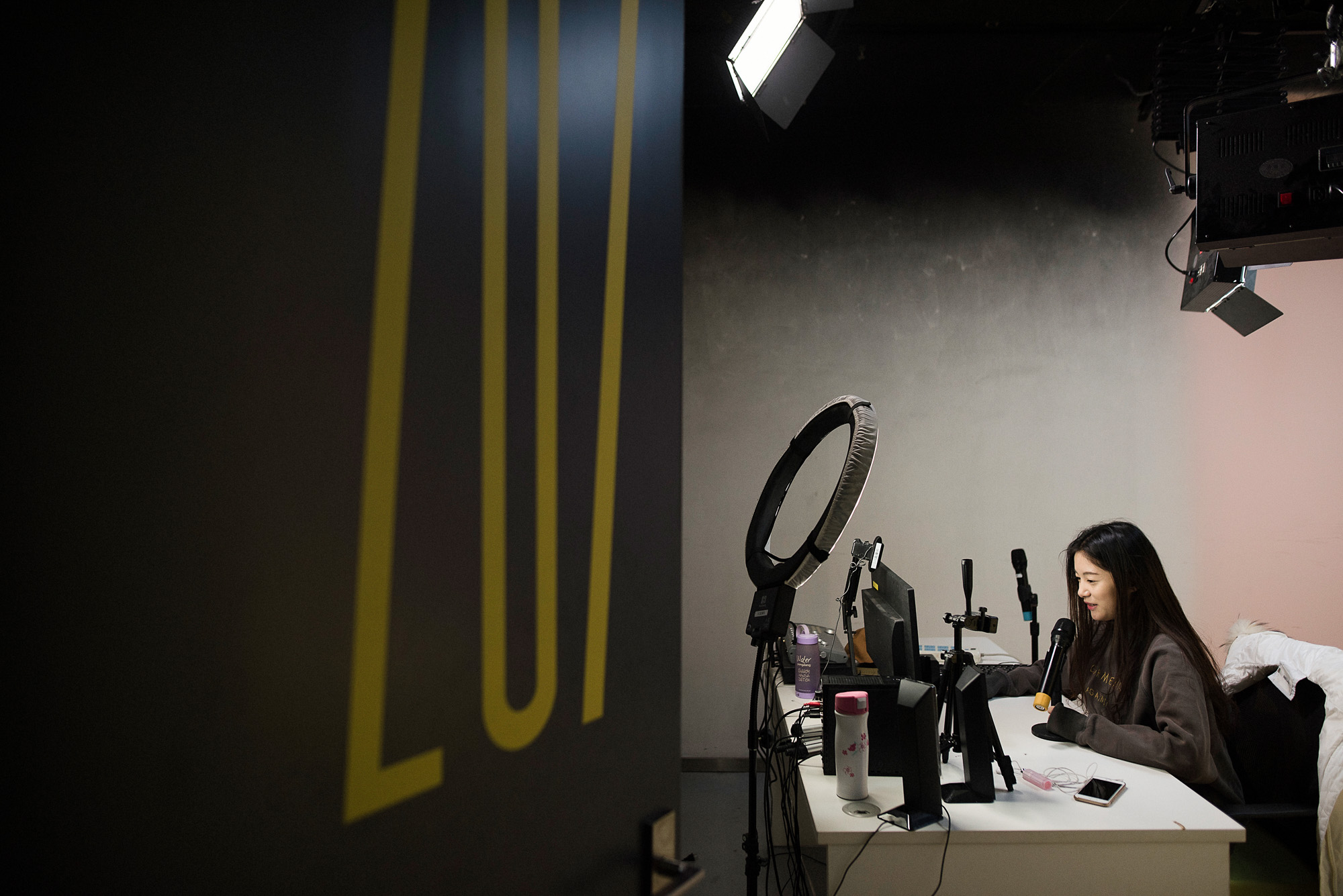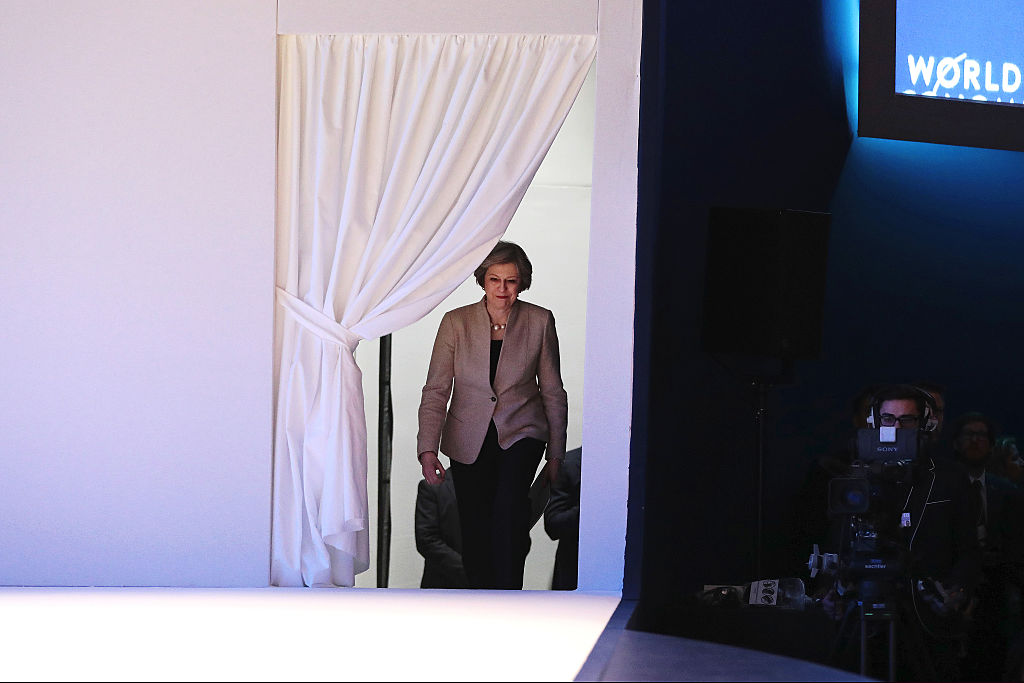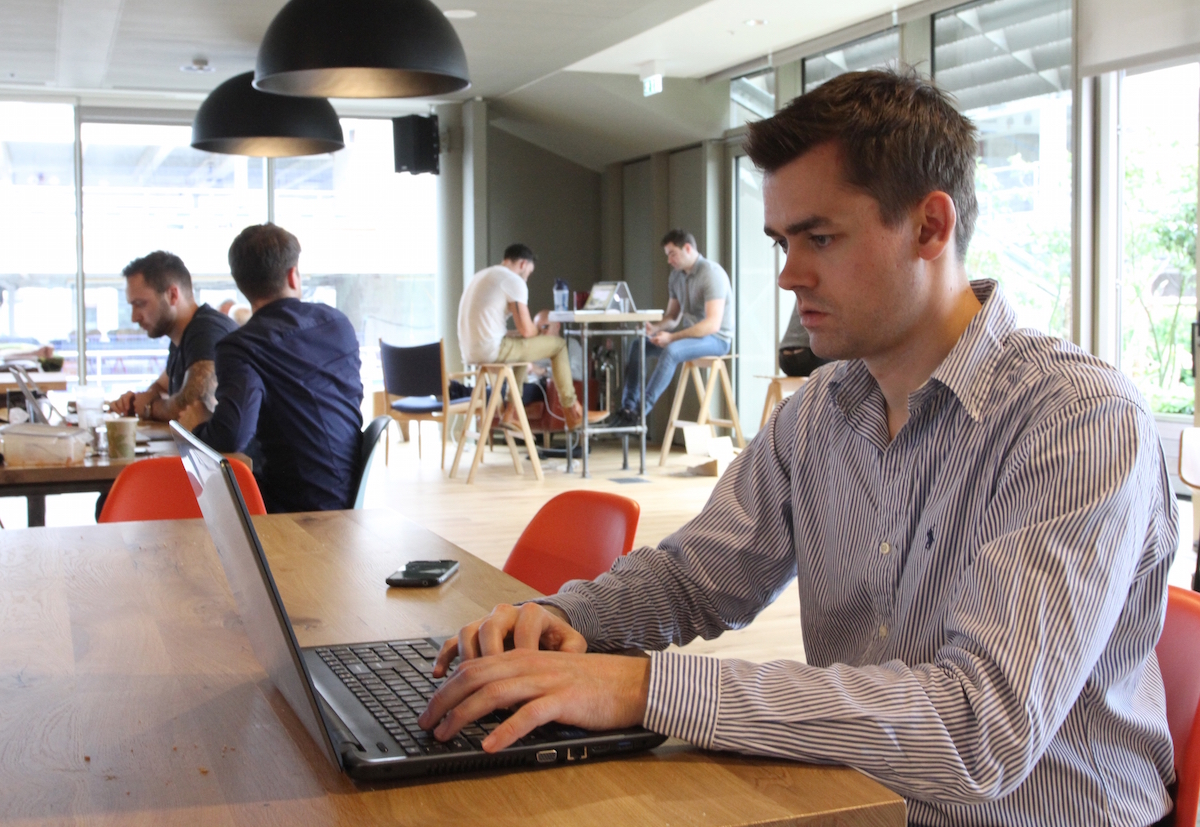China doesn't need Twitch to make its live-streaming take off.
I was told to expect skimpy outfits, but not an overweight man in a pink wig, red lipstick, and a sparkly mermaid tail and bra. But there he was, on stage, blowing kisses at the videoCAMERA and sporadically saying "Thank you!" in a girly voice, like a character from some kind of twisted version of The Little Mermaid.
and sporadically saying "Thank you!" in a girly voice, like a character from some kind of twisted version of The Little Mermaid.
 and sporadically saying "Thank you!" in a girly voice, like a character from some kind of twisted version of The Little Mermaid.
and sporadically saying "Thank you!" in a girly voice, like a character from some kind of twisted version of The Little Mermaid.
ADVERTISEMENT
I hoped that he was getting serious coin for making such a spectacle of himself. Thankfully he probably was, as he was being broadcast live to thousands of viewers on an internet show, the title of which roughly translates to I Am Your Hawaii Girl, in the Beijing headquarters of REDO Media. The firm claims to be China's biggest live-streaming star agency.
I Am Your Hawaii Girl was being shown on the live-streaming app Lai Feng. Behind the cameras the producers, staring at screens showing the footage unfolding, nodded their heads as virtual gifts such as flower and banana emojis streamed in. "Thank you!" Mr Sparkly Mermaid cooed again as digital roses—each representing a one yuan (15 cents) gift—piled up on screen.

Matjaz Tancic/Motherboard
The recent broadband-quick rise in popularity in China of apps such as Lai Feng, and the people who broadcast on them, has caused a new branch of the internet technology industry to spring up around it. The REDO Media agency has around 3,000 internet stars on its books from across China, many of whom self-broadcast as their full-time jobs.
The company invited me to its Beijing office to show me how its iPhone-wielding army of broadcasters made money.
*
REDO Media's large office complex was a primary colour-splattered mash of design styles. Small studios lined dormitory-style corridors; behind eachDOOR was a female broadcaster entertaining followers via a tripod-mounted iPhone. Viewers competed for their attention by giving them digital gifts, that are bought with real money and can be converted back into cash.
was a female broadcaster entertaining followers via a tripod-mounted iPhone. Viewers competed for their attention by giving them digital gifts, that are bought with real money and can be converted back into cash.
 was a female broadcaster entertaining followers via a tripod-mounted iPhone. Viewers competed for their attention by giving them digital gifts, that are bought with real money and can be converted back into cash.
was a female broadcaster entertaining followers via a tripod-mounted iPhone. Viewers competed for their attention by giving them digital gifts, that are bought with real money and can be converted back into cash.
ADVERTISEMENT
In one studio a young bespectacled girl tilted a tiny black rabbit towards her smartphone, excitedly introducing the twitching fur ball to her followers. Next door, a petite woman in a lacey whiteDRESS and a tiara belted out pop songs while holding a massive microphone. In another room a woman sat in front of a huge panda head soft toy and bashed a keyboard, triggering cutesy laughter and squeaking sound effects.
and a tiara belted out pop songs while holding a massive microphone. In another room a woman sat in front of a huge panda head soft toy and bashed a keyboard, triggering cutesy laughter and squeaking sound effects.
 and a tiara belted out pop songs while holding a massive microphone. In another room a woman sat in front of a huge panda head soft toy and bashed a keyboard, triggering cutesy laughter and squeaking sound effects.
and a tiara belted out pop songs while holding a massive microphone. In another room a woman sat in front of a huge panda head soft toy and bashed a keyboard, triggering cutesy laughter and squeaking sound effects.
Matjaz Tancic/Motherboard
Due to the spike in the amount of people watching these streamers live over the past year, doing this full time has become a lucrative job for thousands of women. Women self-broadcasters with the firm outnumber men by around nine to one.
Live-streaming sites such as Douyu paved the way for the industry explosion by facilitating the rise in popularity of live-streaming video games (although Twitch is not censored in China, by having its interface in Chinese Douyu is far more popular in the country). With the Chinese government blocking a huge amount of websites due to strict censorship and an ongoing campaign to "clean up" the internet, Chinese broadcasting sites have flourished in an arena with little international competition.
Realising that a huge amount of men in China like to watch and send messages to girls broadcasting from their bedrooms using such sites and apps, self-broadcasters catering to this market became massively in demand.
"After Chinese New Year last year it really went viral thanks to the era of mobile internet kicking in hard," said Wang Chen, a manager at REDO Media. That prompted the company, which formed in 2013, to start signing up the most promising broadcasters.
I met two of them, 18 year-old Di Tai and 23 year-old Memo, in one of REDO Media's dressing rooms. The pair slapped on makeup and giggled, a propped-up iPhone capturing the scene and broadcasting it live as we chatted. "Hello—I am English" I said to the iPhone, prompting a cascade of "Hello!" messages written in English to cut through the feed of Chinese language messages.
ADVERTISEMENT

Matjaz Tancic/Motherboard

Matjaz Tancic/Motherboard
Along with the mermaid guy, Di and Memo were the main stars of I Am Your Hawaii Girl. Their job was to splash around in water tanks playing picture-drawing games whilst wearing bikinis. "It's basically like going on a beach holiday," said Memo. "At first, before I got in the tank, I was a bit nervous but it started to feelNATURAL . You don't wear a jacket when you're on the beach, right?"
. You don't wear a jacket when you're on the beach, right?"
 . You don't wear a jacket when you're on the beach, right?"
. You don't wear a jacket when you're on the beach, right?"
Di and Memo usually earn a few thousand yuan each per day (1,000 yuan converts to around $145) broadcasting either at home or in a REDO Media studio. Memo, however, said that the most she earned in digital gifts in one week, before the total was split according to her contract, was 410,000 yuan ($60,000). Full-time self-broadcasters get a salary from REDO Media and take home around 20 percent of their total gift earnings after it is divided between them, the agency, and broadcasting platforms.
"That broadcaster who was jailed deserved it. Tougher policies will help purify the industry."
"I mainly sing—and I'm talkative, so I answer questions from viewers," said Di. "As girls, you can always use charm and cuteness," added Memo. "Skills like singing and dancing work. Also, I'll make subtle comments to get gifts such as, 'A broadcasting room like mine would be perfect if I had that gift'. But skills are the mostIMPORTANT ."
."
 ."
."
To hone these skills REDO Media trains up broadcasters with dancing and singing classes—the company has both a dance and recording studio. It also offers advice to the broadcasters about how to deal with the inevitable lewd comments that pop up in their feeds. "It's not uncommon for anyone in this industry to get comments like that," said manager Wang, who encourages broadcasters to simply ignore them. "It's like when people say, 'If you get bitten by a dog, would you bite back?'."
*
ADVERTISEMENT
There's no doubt that REDO Media's female self-broadcasters are largely chosen for their attractiveness, but they seldom do anything racier onCAMERA than show a bit of cleavage. Authorities in China have clamped down hard on the industry over the past year in an attempt to eliminate "inappropriate content" from the web, shutting down thousands of live-stream accounts. Last November a 21 year-old woman from Chengdu was jailed for four years for live-streaming herself enjoying a foursome. In May that same year, "erotic" banana eating in live-streams was banned.
than show a bit of cleavage. Authorities in China have clamped down hard on the industry over the past year in an attempt to eliminate "inappropriate content" from the web, shutting down thousands of live-stream accounts. Last November a 21 year-old woman from Chengdu was jailed for four years for live-streaming herself enjoying a foursome. In May that same year, "erotic" banana eating in live-streams was banned.
 than show a bit of cleavage. Authorities in China have clamped down hard on the industry over the past year in an attempt to eliminate "inappropriate content" from the web, shutting down thousands of live-stream accounts. Last November a 21 year-old woman from Chengdu was jailed for four years for live-streaming herself enjoying a foursome. In May that same year, "erotic" banana eating in live-streams was banned.
than show a bit of cleavage. Authorities in China have clamped down hard on the industry over the past year in an attempt to eliminate "inappropriate content" from the web, shutting down thousands of live-stream accounts. Last November a 21 year-old woman from Chengdu was jailed for four years for live-streaming herself enjoying a foursome. In May that same year, "erotic" banana eating in live-streams was banned.
You won't find any suggestive fruit sucking in the booths at REDO Media.

Matjaz Tancic/Motherboard
"Tougher regulations are a good thing," said Wang. "That broadcaster who was jailed deserved it. Tougher policies will help purify the industry."
Indeed, Zi Jing, a 23 year-old broadcaster who is one of the company's star performers, was the picture of sweetness and innocence during my visit. She sauntered through the office's corridors, resplendent in her elegant white frock, her selfie stick holding her constantly-filming iPhone in front of her.
Zi has around 390,000 subscribers on Lai Feng, and helps host shows such as I Am Your Hawaii Girl. She earns "a couple of hundred thousand yuan" (100,000 yuan converts to around $14,500) a day before the money is split, broadcasting to between 50,000 and 100,000 people during sessions that last around eight hours.
"I am real and natural," she said when I asked what the secret of her success was. "Not many people like pretentious girls these days, or girls with 'cosmetic' style faces."
ADVERTISEMENT
Some impressively sneaky tactics, as well as this "real"-ness, have contributed to Zi's success. "For example, if someone sends me a gift I'll say, 'Oh, did you give me a gift? I didn't see it. Can you please send it again?'"

Matjaz Tancic/Motherboard

Matjaz Tancic/Motherboard
Many of the self-broadcasters working with agencies such as REDO Media have ambitions to be proper 'real life' celebrities, and go on to work inTV . For many, though, working as a self-broadcaster is lucrative enough. It provides easy, flexible work: a tempting alternative to normal rat race employment in China's cutthroat graduate job market.
. For many, though, working as a self-broadcaster is lucrative enough. It provides easy, flexible work: a tempting alternative to normal rat race employment in China's cutthroat graduate job market.
 . For many, though, working as a self-broadcaster is lucrative enough. It provides easy, flexible work: a tempting alternative to normal rat race employment in China's cutthroat graduate job market.
. For many, though, working as a self-broadcaster is lucrative enough. It provides easy, flexible work: a tempting alternative to normal rat race employment in China's cutthroat graduate job market.
But how satisfying is making a living letting peopleWATCH you flounce around all day through your iPhone? Does it make the broadcasters' parents proud? Memo insists it does. "My mum actually broadcasts with me—we both go onCAMERA
you flounce around all day through your iPhone? Does it make the broadcasters' parents proud? Memo insists it does. "My mum actually broadcasts with me—we both go onCAMERA ," she said. "She thinks being a broadcaster is not as easy as people think. Some are sexy, some are funny, but she sees what I am doing as more like being a comedian, bringing laughter to the audience. She supports me."
," she said. "She thinks being a broadcaster is not as easy as people think. Some are sexy, some are funny, but she sees what I am doing as more like being a comedian, bringing laughter to the audience. She supports me."
 you flounce around all day through your iPhone? Does it make the broadcasters' parents proud? Memo insists it does. "My mum actually broadcasts with me—we both go onCAMERA
you flounce around all day through your iPhone? Does it make the broadcasters' parents proud? Memo insists it does. "My mum actually broadcasts with me—we both go onCAMERA ," she said. "She thinks being a broadcaster is not as easy as people think. Some are sexy, some are funny, but she sees what I am doing as more like being a comedian, bringing laughter to the audience. She supports me."
," she said. "She thinks being a broadcaster is not as easy as people think. Some are sexy, some are funny, but she sees what I am doing as more like being a comedian, bringing laughter to the audience. She supports me."
An hour later, Memo and Di threw off theirDRESSING gowns to reveal their bikini-clad figures, clambered into the water tanks and began splashing around. On the screen next to them, the digital roses started piling up once more.
gowns to reveal their bikini-clad figures, clambered into the water tanks and began splashing around. On the screen next to them, the digital roses started piling up once more.
 gowns to reveal their bikini-clad figures, clambered into the water tanks and began splashing around. On the screen next to them, the digital roses started piling up once more.
gowns to reveal their bikini-clad figures, clambered into the water tanks and began splashing around. On the screen next to them, the digital roses started piling up once more.
Watch This Next

2:02
BIOFABRICATE: BIODEGRADABLE SNEAKERS
SIGN UP FOR MOTHERBOARD PREMIUM.
Where we're going, we don't need email.
ADVERTISEMENT

FEATURES
The Spectre of Brexit Is a Real Drag on British Startups
Seven months on, those in the tech scene are worried the foreign workers powering the Silicon Roundabout will disappear.
Joris Magenti, a young entrepreneur based in London, knows firsthand how frustrating borders can be. Born in France, Magenti grew up in Spain, close to the French-Spanish border. Magenti recalled trips between the two countries, before freedom of movement came into effect under the Schengen Agreement, as laborious, unnecessarily complicated, and tiring. Magenti and his family had to change currencies, present passports, and wait in long queues.
"When they opened the markets and the borders, that was amazing," Magenti told me, as if recalling a miracle he'd witnessed firsthand.
After working as a consultant for the United Nations, Magenti decided to attend business school at the University of Oxford. Thanks to freedom of movement under EU law, Magenti's move to the UK—and his subsequent decision to stay—seemed so natural as to be nearly thoughtless, like an American choosing to move to a different state after college.
When Magenti and his classmate Vana Koutsomitis, a dual citizen of Greece and the United States, decided to create a new dating app, they chose to establish their company, DatePlay, in London. While neither Magenti nor Koutsomitis hold British citizenship, both hold the right to live and work in the UK as citizens of the EU. Magenti laughed as he recounted how simple it was to start making his entrepreneurial dreams a reality: "In Spain, building a company takes weeks or even longer. Here you can do it very fast. You can register a company online!"
The path Magenti took to establish a start-up in the UK is a common one. Drawn to the UK by top-ranked degree programs, job offers from large tech firms, and the familiar desire to move to the big city, young European entrepreneurs and engineers from across the Continent now stand at the heart of Britain's burgeoning tech scene. But today, the image of Britain as a sound environment for disruptive innovation is under threat as a result of one of the most politically disruptive events in modern British history: the nation's decision to leave the European Union, and the ongoing political uncertainty that has followed.
Ricardo Varela, a Spanish-born engineer, explained that before Brexit, there were two clear options for European entrepreneurs hoping to grow their startups: Move to the UK, or move to the US. Varela worked as an engineer for several major tech companies in the US and UK before deciding to establish his own company, Localisto, in London. "Up until now, you didn't have to double think, Is the UK the right place? Everybody thought, it's either the States or the UK."

UK Prime Minister Theresa May enters the stage at the 2017 World Economic Forum. Her speech came amidst continued uncertainty about the effect on Brexit on global business, although she has said Brexit will indeed happen. Image: Bloomberg
Then, of course, there was Brexit. On June 24, stunned UK residents woke to the news that Britain had voted to leave the European Union. The certainty and uncluttered regulatory environment the Britain was known for were thrown to the wind. Hours after the vote was announced, Prime Minister David Cameron—a vocal champion of the British startup scene—resigned, triggering weeks of political chaos. The instability that followed made it clear to the global markets that no one had a concrete plan, or even definition, for Brexit, and the pound tanked. The currency and the political system of the UK, previously viewed as a solid bet, suddenly appeared tenuous.
Riding the Underground in the early weeks after the Brexit vote, it was not uncommon to see Londoners openly crying in public. (As an American resident of London, I can say that few things so clearly signalled the unprecedented nature of the Brexit vote as the sight of the perennially-reserved British population expressing sincere emotions in public.)
Seven months on, the United Kingdom remains plagued by uncertainties. For months, Prime Minister Theresa May spoke in Zen koans rather than concrete policies, confirming only that "Brexit means Brexit" and that she will push for a "Red, White, and Blue" Brexit. Earlier this month, May delivered a sliver of information to the public in a speech on Brexit, confirming that Britain will not seek to remain in the European single market. But when pressed for further concrete details on the government's Brexit priorities, May again reverted to vague catch-phrases, this time warning the EU that "no deal for Britain is better than a bad deal for Britain."
More intel on Brexit has emerged from the accidental flash of aides' notepads than from any official government statement. Over the course of five weeks of reporting on Brexit and the UK tech scene, all requests for comment from the UK government went unanswered. And while entrepreneurs are used to risk, with each month that passes without clear information on the direction of Brexit, the image of the UK as a stable and welcoming place to start a business continues to erode.
"In a startup, when something goes wrong, you just get on and deal with it," Stephen Bourke, co-founder of health-tech startup Echo, told me. "But without being able to know what we're reacting to at the moment, it's difficult to plan. We need to rip off the plaster and get on with it, because then we'll know what we're contending with. We need to stabilize."
"We need to rip off the plaster and get on with it."
As we split a cinnamon bun at Nordic Bakery, a cafe down the road from Google's London Headquarters, Varela, visibly frustrated, told me, "The way [the government] is doing this thing is worse than the thing itself." We were surrounded by the din of other tech workers on their caffeine breaks. The duo at the table next to ours seemed to overhear our interview, and began their own chat about Brexit. "It's not actually going to happen," one man muttered to the other. Many of the entrepreneurs who spoke to Motherboard expressed their own ongoing doubts as to whether Britain would, eventually, leave the EU at all—an outcome that May appears to have dashed.
The lingering suspicion that Brexit might not go forward is wishful thinking on the part of an industry reliant on European talent and uncomplicated access to the European single market. The government has given no clear indication as to whether or not startups will be given assistance in sponsoring foreign workers after Brexit. Hiring and sponsoring an employee from outside of the EU is costly in the UK, and most startups can't afford the process. Entrepreneurs fear that if EU citizens will require visa sponsorship to work in the UK, startups will fail for lack of talent.
"If I want to hire candidates from the US or Canada, it's not affordable," Stan Karpenko, a Lithuanian-born entrepreneur, told me. "If Europeans are treated the same, this is going to be my number one nightmare."
Karpenko knows the value of the EU talent pool firsthand. Until recently, his Birmingham-based company GiveVision was run exclusively by immigrants. "My CTO is from Poland," Karpenko told me, "my co-founder is French, from French Polynesia. We have interns from the US and we had temporary workers from China. We didn't have a single British person." GiveVision, which develops smart glasses that function as eyes for the blind, now has two British employees on its team of five.
When I asked Karpenko why his company had so few Brits on board, he explained that the British engineers he interviewed didn't come across as "as motivated and skilled and agile and willing to work" as the foreign-born workers. Another entrepreneur, who did not wish to be named, said that British tech graduates are largely risk-averse, and more likely to work for larger, more established tech companies than to take the leap into lower-paid, less-stable startup positions. While Brexiteers trumpet the importance of giving British workers first pick of British jobs, it's unclear whether British workers want these high-risk startup jobs in the first place.
Other startups rely heavily on offshore tech talent, and it is unclear how Brexit will complicate their ability to pay remote EU workers. Freedom of movement and tax scheme agreements across EU nations have allowed for novel arrangements at British startups. Irish entrepreneur Stephen Bourke's team at Echo, for example, has one employee in Austria and two in Poland. "Three weeks a month, that's their home, and one week a month with us. What does [Brexit] mean, for us and for them?" he said. Similarly, Varela's company employs skilled designers based in Spain, while Magenti's app is being built in part by developers in Europe and Latin America.

Frank Bertele, CEO of the financial services startup Netz, in July 2016. Five investors in Netz suspended hundreds of thousands of pounds in investment within a day of the Brexit vote. Image: Leonora Beck/AP
For companies whose contracts with overseas workers were written in GBP, offshore employees were forced to take a sudden 15 percent pay cut after the post-Brexit pound crash. For companies whose offshore worker contracts were tied to local currencies, projected costs were abruptly raised.
In this sense, the Leave voter who envisioned a Britain where jobs currently held by EU workers will now go to British-born UK citizens was dreaming of a pre-digital past. While there may be fewer immigrants to the UK after Brexit, the digital jobs may not come back.
After the Brexit vote, the UK must now decide whether it will restrict companies who rely on remote workers, both inside and out of the EU, or whether it will continue to allow companies to grow by taking advantage of the eager, lower-cost international workforce. At present, the latter seems more likely. If that is the case, Brexit will see not a rise in jobs for British citizens but an even greater shift of job opportunities to workers living overseas as the end of EU free movement makes remote workers the more economical option.
"It's open season."
Professor Hanadi Jabado, the executive director of the Entrepreneurship Centre at Cambridge's Judge School of Business, expressed concerns beyond the question of talent, saying that the combination of Brexit instability and a weak pound was creating a hunting ground for American and Asian firms to acquire nascent British startups.
"The UK is amazing at innovation," Jabado told me, citing the UK's significant internal investment in research. "Very often you see big US companies come here to shop for leading-edge technology and great brains. Already we were seeing a lot of our companies being acquired by US companies. Before [Brexit], this was happening a lot. Now, with Brexit, and the pound so weak, we have become a third cheaper."
Jabado pointed out that within a week of Brexit, the Japanese firm SoftBank had acquired the UK research firm ARM. She adamantly believes that if the vote had been Remain, the firm would still be in Britain. "It's open season," Jabado told me, shaking her head.
This tidal wave of uncertainties has led many to speculate as to whether another European capital will take over London's place of privilege in the European startup ecosystem. Berlin, Barcelona, Amsterdam, and Paris have each been floated as possible new hubs. But Alexandre Covello, founder and CEO of investment-led accelerator AngelsCube, shrugged off these suggestions. When I asked whether he thought, say, Berlin, might compete with London in the years to come, he pointed out some obvious impediments: "They speak German. It's a different ballgame altogether. The startups, the regulatory framework, the money, the big names: they're all in London."
And while Varela, Magenti, and Karpenko each conceded the attractions of other cities—citing the lower cost of living, better food, and better weather alongside guaranteed access to the European single market—none have plans to move their companies out of London in the foreseeable future.
In this sense, what emerged from my conversations, alongside all the unease and frustration, was a sense of UK-based entrepreneurs' determination to make it work here in Britain. Bourke re-affirmed his love of London.
"I've lived in Paris and New York and for me, London is like nowhere else," he said. "It's a total integration of people. London is properly mixed up, properly messy. I don't see that changing. If you look at immigrants in London, they are CEOs, they are hedge fund managers, they are startup entrepreneurs. You don't see that so much in the rest of Europe. London's not going anywhere."
Brave faces aside, the Brexit vote has still left many European entrepreneurs shaken. At the end of our interview, Magenti, who had projected so much optimism throughout our conversation, sighed. I asked him whether he wanted to add something. "At the personal level it's very annoying," he said. "At some point you just hope all these tensions disappear so you can focus on the work. In the UK, if your startup or your idea starts happening here, you feel accepted. Then you have this Brexit situation, and it's confusing. You know, do they want me? It creates a disconnect."
An advertisement trying to lure British tech companies to Berlin, as shown in London in July 2016. Image: Matt Dunham/AP
ADVERTISEMENT




No comments:
Post a Comment